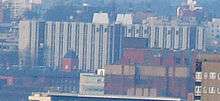Leeds School of Medicine
Coordinates: 53°48′04″N 1°33′07″W / 53.801°N 1.552°W
 The Worsley building from afar | |
| Type | medical school |
|---|---|
| Established | 1831 |
| Dean | Professor Paul Stewart |
| Location | Leeds, England |
| Affiliations | University of Leeds |
| Website | http://www.leeds.ac.uk/medicine |
Leeds School of Medicine is the medical school of the University of Leeds, Leeds, West Yorkshire, England. The School of Medicine was founded in 1831, before the Yorkshire College which became the university, and now forms part of the university's Faculty of Medicine and Health. It is located at the southern end of the campus in the Worsley Building, which also houses the Leeds Dental Institute. The School of Medicine is linked with the two major hospitals for clinical teaching: the Leeds General Infirmary and St James's University Hospital, both run by the Leeds Teaching Hospitals NHS Trust. As of 2008 the medical school accepts some 238 home students and a further 20 from overseas per year.[1]
History
On 6 June 1831 six physicians and surgeons set up the Leeds medical school with the aim:
| “ | it is desirable that a School [of Medicine] be established in Leeds for the purposes of giving such courses of lectures on subjects connected with Medicine and Surgery as will qualify for examination at the College of Surgeons and Apothecaries' Hall. | ” |
The medical school admitted its first students in October of that year. It was one of ten provincial medical schools founded in the ten years between 1824-1834.
The founders were:
- Dr James Williamson
- Dr Adam Hunter
- Mr Samuel Smith
- Mr William Hey III
- Mr Thomas Pridgin Teale
- Dr Joseph Prince Garlick
The first premises were the Leeds Public Dispensary on North Street in the town but in 1834 the school was moved to new premises at 1 East Parade. In 1979, it moved to its current location in the Worsley Building.
Teaching
The medical training in Leeds lasts five years although an optional intercalated degree can be taken making the course six years. The MB ChB degree is divided into three phases. Phase I (Preparing for Clinical Practice) encompasses years one to three, Phase II (Clinical Practice in Context) encompasses year four and Phase III (Becoming a Doctor) encompasses year five and Foundation year one. Leeds was ranked 9th in the Guardian medicine league table 2008.
Institutes within the school of medicine
The school of medicine is split up into four institutes. These are:
- LIGHT - Leeds Institute of Genetics and Health Therapeutics
- LIMM - Leeds Institute of Molecular Medicine - Based at St James's Hospital
- LIHS - Leeds Institute of Health Sciences - Includes the Nuffield Centre for International Health and Development
- LIME - Leeds Institute of Medical Education
Intercalating
Every year around half of all Leeds Students take a year out to study another related degree (BSc) in a process called intercalating. Many Medical/veterinary/dental students from other universities also come to Leeds to study. The intercalated degrees on offer include; Primary care, International Health, Medical Physics, Human Physiology, Sport's Science, Neuroscience, Zoology, Pharmacology, Medical Ethics, Clinical Science, Psychology, Microbiology and Anatomy.
Notable alumni
Professor Alastair Hay - campaigner against chemical and biological warfare.[2]
Berkeley Moynihan - a noted British abdominal surgeon.
William Pickles - British general practitioner and epidemiologist.
Harold Shipman - general practitioner convicted of murdering 15 of his patients; later Police found evidence that the total was closer to 250.
References
- ↑ "www.ukmedicalschools.com UK Medical School Statistics". ukmedicalschools.com. Archived from the original on 4 December 2008. Retrieved 8 September 2008.
- ↑ Multiple uses of Chemicals
External links
- Leeds School of Medicine Official Website
- Leeds Medical Students Representative Council (MSRC)
- Leeds Medical society
- Clinical Sciences at the University of Bradford
| |||||||||||||||||||||||||||||||||
| ||||||||||||||||||||||||||||||||||||||||||||
